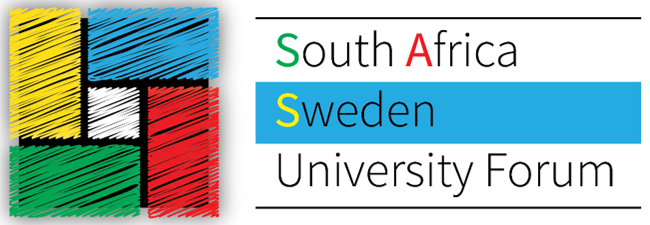SASUF Receives 13,5 Million SEK in Funding Grant to Launch SASUF+ Phase
Published: 03-07-2025
SASUF has been awarded a 10 million SEK grant from the Swedish Foundation for International Cooperation in Research and Higher Education, STINT, and a 3,5 million SEK grant from National Research Foundation of the Republic of South Africa, NRF. These fundings mark the start of the new funding period SASUF+, running from August 2025 to August 2028. Events, calls for funding, and opportunities to engage will be presented in September 2025.
What is SASUF+?
The SASUF+ phase builds on a strong foundation of strategic collaboration between 37 South African and Swedish partner universities. The SASUF+ initiative focuses on deepening collaborative partnerships, promoting joint innovation and addressing societal challenges through a glocal approach that considers both global and local conditions.
“I am extremely happy that STINT continues to support the SASUF collaboration, the SASUF+ phase. With this new phase, it gives us the chance to go deeper and wider by expanding the partnerships, to include even more universities and stakeholders, while we are taking concrete steps towards decentralising the project governance to increase co-ownership, sharing leadership more broadly, and reaching further into society. With a glocal mindset, SASUF+ becomes not just a partnership, but a shared space for learning, action and long-term impact.”
— Vice-Chancellor Anders Hagfeldt, Uppsala University
Vice-Chancellor Anders Hagfeldt, Uppsala University.
Key Themes and Work Packages
The next SASUF+ phase will advance interdisciplinary research in four key thematic areas: Sustainable Health, Green Transition, Migration and Urbanisation, as well as Democracy, and Social Justice and Indigenous Knowledge Systems. Further, the themes will play a key role in the new Work Packages (WP) throughout the SASUF+ phase.
WP 1: Academia, Industry, Society – Dialogues for Impact
WP 2: SASUF+ Beyond Borders
WP 3: Students as Gamechangers
WP 4: Science and Education Policy – From Policy to Action
WP 5: Communication and Dissemination
WP 6: Coordination
WP 1: Academia, Industry, Society — Dialogues for Impact
SASUF+ will embody a sustainable and innovative mindset, introducing virtual engagement prior to mobility in order to enhance the quality of in-person meetings. Further, SASUF+ strives to contribute to all societal levels. To achieve this, promoting multisectoral partnerships beyond academia will be key within the new funding period. This will allow SASUF+ to target contemporary global grand challenges and play a pivotal role in addressing these. WP 1 introduces virtual Academic Industry Meeting Day, AIMday, fostering stronger collaboration between academia and industry.
WP 2: SASUF+ Beyond Borders
The forthcoming period will also involve further expansion, new African institutions participating in SASUF+ activities. WP 2 is centered around priority themes which ensure both region-specific and broadly applicable relevance across the African continent. Thereby, the new participating institutions will play a vital part in the further reach of the project in addressing shared regional and global challenges.
Participants at the Research and Innovation Week 2024, hosted by Malmö University, Lund University and The Swedish University of Agricultural Sciences.
WP 3: Students as Gamechangers
During SASUF+, opportunities will expand for South African and Swedish Master’s and PhD students to participate in international research. WP 3 promotes early career development through student engagement, a sustainable leadership model, and interdisciplinary hackathons addressing real-world challenges. WP 3 also offers stipends for fieldwork abroad, providing hands-on experience. Additionally, SASUF+ will support long-term mobility for PhD and postdoctoral researchers, strengthening cross-border knowledge and networks.
WP 4: Science and Education Policy — From Policy to Action
The SASUF+ phase will continuously align with the United Nations Sustainable Development Goals (SDGs) and the African Union’s Agenda 2063. WP 4 focuses on identifying AU-EU opportunities to better align funding priorities and develop actionable strategies for implementation. By aligning AU-EU priorities, SASUF+ will help navigate complex policy landscapes and contribute to strong long-term partnerships.
“This pan-African vision not only broadens impact but also reinforces Sweden’s role in global academic diplomacy. The commitment to “glocal” thinking—bridging global challenges with local solutions—is particularly noteworthy and substantiates the project’s relevance and timeliness.”
— Quoted from STINT external review on the SASUF+ application, June 2025.
WP 5: Communication and Dissemination
WP 5 ensures establishment of a comprehensive communication plan which will determine target audiences, key messaging, communication channels, such as online platforms, social media, academic publications and events. The plan will guide the outreach during SASUF+ and enable efficient dissemination of results, increase visibility and enhance stakeholder engagement.
WP 6: Coordination
Involving more partner universities will contribute to decentralisation of project governance and help achieve clarity in decision-making processes and monitoring progress. While Uppsala University will take on a coordinating role, facilitating communication between partner universities, WP 6 decentralises co-ownership through the initiation of work package leads for each WP. This structure will ensure active implementation of key themes and WPs, while also enabling all voices to be heard in the network. The work package leads will work in close collaboration with university coordinators and the Steering Committee, which will be composed of Vice-Chancellors, local coordinators and student representatives.
The purpose of STINT’s Strategic Grants is to support pioneering efforts that enhance integrated internationalisation. NRF’s primary mandate is to contribute to national development by supporting research, human capacity development, and the maintenance of research infrastructure. The funding decisions were announced on the 23rd of June 2025.



